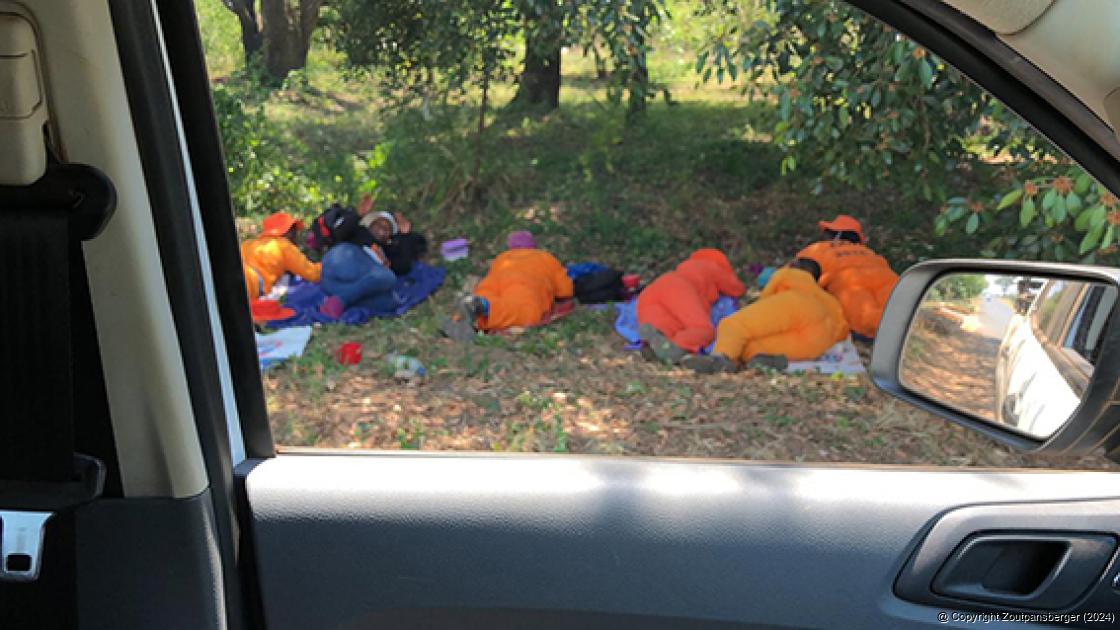

ADVERTISEMENT:

The sight of what Levubu residents believed to be a group of municipal workers having a snooze in the shade begun an investigation that, at this point, appears to point to the non-payment of innocent employees. Photo supplied.
Layabouts or victims?
Date: 12 November 2018 By: Jo Robinson
“Why is our tax money being spent to pay people to lie around and sleep under trees all day?” This is the question asked a little over a week ago by a distressed Levubu resident, Lana Hoffman. She contacted the paper with what began as a complaint that Louis Trichardt residents may be accustomed to hearing and repeating quite often.
A group of people dressed in bright orange overalls with the Expanded Public Works Programme (EPWP) logo on their jackets had been spending their days mainly lying in the shade on the sidewalk close to Rev Petrus Kriel’s home (on the G road). This situation had been ongoing for several weeks, Hoffman told the newspaper, and many residents were complaining about this blatant squandering of taxpayers’ money. Not only were these people lounging around all day, long after they had been dropped off every morning and before being collected every evening, but they were making fires by the roadside to cook meals for themselves. The area around them was looking messy and residents were getting angrier and angrier.
Eventually, Kriel decided to approach these apparent layabouts and enquire directly from them as to the reason for their behaviour.
When Kriel shared what he had been told with Hoffman and other interested Levubu residents, shame set in. He was told that these people had been employed by a contractor to work for a six-month term as part of the government’s EPWP programme. However, they continued, this contractor had not paid them their wages for two months. Terrified of not showing up every day for work, in case their employer then had an excuse to charge them with desertion and, in so doing, not pay them at all, they had tried to show up daily. They were simply waiting every day, they said, hoping to get paid.
The previously angry Levubu residents were now filled with empathy and shame at their instinctive reactions, and Hoffman and Kriel agreed that people should not be overly quick to judge others merely on appearances. They requested that the newspaper follow up on this issue, with the hope that, by doing so, help would be forthcoming to the unpaid and desperate workers.
When the paper finally did manage to contact one of these workers on her cellphone, the newspaper was informed that all was well as the contractor had now agreed to pay them, followed by an SMS on 6 November that they had finally been paid. The contract has apparently expired for both the EPWP workers and Levubu. The newspaper will continue to follow up on the story and try to contact the contractor. After getting paid, one of the EPWP workers said that no further need existed to phone their employer.
The EPWP programme was launched by the government in 2004, stemming from the Growth and Development Summit (GDS) of 2003. At the summit, four themes were adopted, one of which was ‘More jobs, better jobs, decent work for all’. The aim of the programme is to provide poverty-and-income relief for the unemployed. They are mostly local, low-skilled persons. These EPWP workers are employed on a temporary or on-going basis, either by the government, by contractors, or by other non-governmental organisations under the Ministerial Conditions of Employment for the EPWP or learnership employment conditions. Up to October, these EPWP employees earned R88 per day. Media reports this week, however, indicated that the Department of Public Works has increased this daily minimum wage to R92,31 as of 1 November.
Viewed: 886
|
|
Tweet |

-

MMSEZ now also looking at nuclear power
19 April 2024 By Andries van Zyl -

Woede ná R524 nog ‘n lewe eis
19 April 2024 By Andries van Zyl -

T20-spanne hervat liga ná kort breek
19 April 2024 By Andries van Zyl -

Vrae oor waarom Vhembe so sloer?
18 April 2024 By Andries van Zyl -

Border fence contractors lose appeal
18 April 2024

Jo Robinson
Jo joined the Zoutpansberger and Limpopo Mirror in 2018 pursuing a career in journalism after many years of writing fiction and non-fiction for other sectors.

More photos...

ADVERTISEMENT


-

Local para-athletes shine at SA Champs
05 April 2024 -

Former Triegie’s acting career taking off
12 April 2024 By Karla van Zyl -

Epic finish for local cycling duo
29 March 2024 By Andries van Zyl -

MMSEZ now also looking at nuclear power
19 April 2024 By Andries van Zyl -

Debt-collection company apologises for rude letter
29 March 2024 By Anton van Zyl

ADVERTISEMENT:


ADVERTISEMENT


